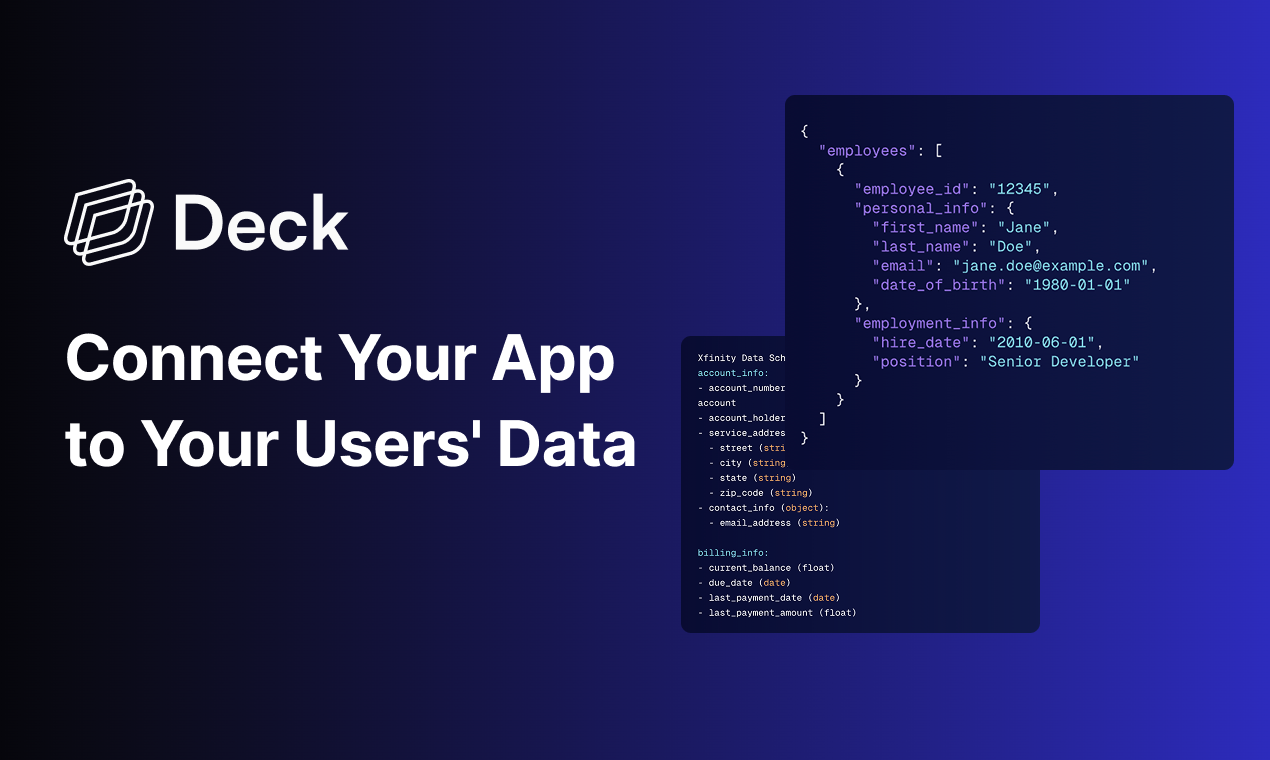Table of Contents
Overview
In today’s data-driven world, seamless access to information is paramount. But what happens when critical data is locked away in legacy systems or scattered across various platforms? Enter Deck, a data infrastructure platform designed to break down these silos and provide secure, scalable access to user-permissioned data across diverse industries. From telecom and utilities to ERP and ecommerce, Deck offers a unified solution for connecting to and leveraging data, even where direct API access is absent. Let’s dive into a comprehensive review of this powerful tool.
Key Features
Deck boasts a robust set of features designed to simplify data access and integration:
- User-permissioned data access: Ensures data is accessed and used only with explicit user consent, maintaining privacy and compliance.
- Integration with 100K+ providers: Connects to a vast ecosystem of data sources, offering unparalleled breadth of coverage.
- Cross-industry applicability: Serves diverse sectors including telecom, utilities, ERP, and ecommerce, making it a versatile solution.
- Scalable infrastructure: Handles large volumes of data and supports growing business needs without compromising performance.
- Developer-friendly platform: Provides comprehensive tools and resources for developers to easily integrate and customize the platform.
How It Works
Deck simplifies data access by acting as a bridge between your applications and a multitude of data sources. The platform connects to thousands of data sources, all with user consent. It normalizes and delivers the data through a single, unified API, even in situations where direct API access is non-existent. This streamlined approach eliminates the complexities of dealing with disparate data formats and protocols, saving time and resources.
Use Cases
Deck’s versatility makes it suitable for a wide range of applications:
- Financial services integration: Streamlines access to financial data for improved customer onboarding and risk assessment.
- Telecom and utility account data aggregation: Enables easy access to customer account information for enhanced service delivery and personalized experiences.
- ERP system connectivity: Facilitates seamless data exchange between ERP systems and other applications, improving operational efficiency.
- Ecommerce and order data synchronization: Provides real-time access to order data for improved inventory management and customer service.
Pros & Cons
Like any tool, Deck has its strengths and weaknesses. Understanding these can help you determine if it’s the right fit for your needs.
Advantages
- Broad industry coverage: Supports a wide range of industries, making it a versatile solution for various data integration needs.
- Strong data compliance focus: Prioritizes data privacy and security, ensuring compliance with relevant regulations.
- Developer support with sandbox: Offers comprehensive developer resources and a sandbox environment for easy testing and integration.
- Works with legacy systems: Connects to systems without APIs, unlocking valuable data previously inaccessible.
- Scalable infrastructure: Designed to handle large volumes of data and support growing business needs.
Disadvantages
- Custom pricing may deter smaller clients: The pricing structure may not be suitable for startups or small businesses with limited budgets.
- Complexity for non-technical users: Requires some technical expertise to set up and manage, potentially posing a challenge for non-technical users.
How Does It Compare?
When considering data integration solutions, it’s important to compare Deck with its competitors.
- QuickBooks Online: While excellent for accounting, QuickBooks Online lacks the data access flexibility and cross-industry applicability of Deck.
- Shopify Plus: Focused solely on ecommerce, Shopify Plus doesn’t offer the broad data integration capabilities of Deck.
- BigCommerce: Similar to Shopify Plus, BigCommerce is ecommerce-centric and lacks support for industries like utilities or telecom, which Deck readily supports.
Final Thoughts
Deck offers a powerful solution for organizations seeking to unlock the value of their data. Its broad industry coverage, strong data compliance focus, and developer-friendly platform make it a compelling choice for businesses of all sizes. While the custom pricing and potential complexity may be drawbacks for some, the benefits of seamless data access and integration often outweigh these concerns. If you’re looking for a robust data infrastructure platform that can handle diverse data sources and complex integration scenarios, Deck is definitely worth considering.
